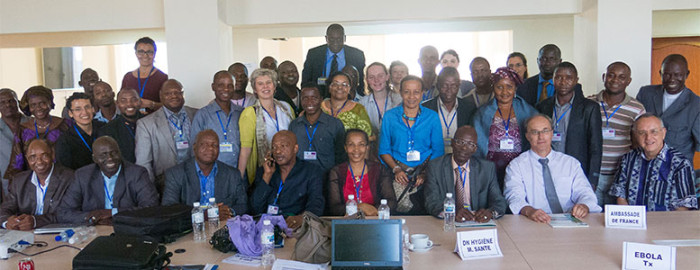A group of over 30 Guinean alumni of the Institute of Tropical Medicine joined forces with the national coordination for the control of Ebola for a nation-wide reflection on the fight against the Ebola virus disease. The meeting in the capital city of Conakry on Wednesday 29 January 2015 was made possible by the support of the Belgian Development Cooperation.
Each year, hundreds of students from developing countries follow specialized courses at ITM in Antwerp. Many of these physicians and researchers take up strategic positions in their countries’ health systems during the course of their careers. They remain in touch with their peers and ITM, through alumni and other networks.
ITM alumnus Dr. Alexandre Delamou is field coordinator of the European Union funded Ebola-Tx project led by ITM. He organised a meeting with ITM alumni and all actors involved in the national Ebola response to reflect on the challenges and lessons learned during the current epidemic .
“We have had the opportunity to study tropical diseases and public health issues at an international level in Antwerp. As ITM alumni we feel it is our responsibility to take the lead in the fight against Ebola. Personally, I have suspended my PhD project in Antwerp to return to Guinea,” said Alexandre Delamou. “This national reflection meeting comes at a time where we are seeing a positive evolution a in the current Ebola crisis, but we should not let our guard down. The Ebola epidemic is not over until no new cases are reported.”
In light of the declining number of new cases across Guinea, Liberia and Sierra Leone, participants discussed how to approach the tail of the current epidemic, and how to avoid new cases causing similar havoc in the future.
ITM’s Prof. Marie Laga, an expert on international HIV/AIDS policies, attended the Conakry meeting:
“At ITM we support and encourage alumni activities. It is a pleasure to reflect with former students on the current Ebola epidemic and the importance of strengthening health systems in the worst affected countries. We can also learn some important lessons from HIV/AIDS, a very different virus, which posed similar challenges when it first emerged in the early 1980s. If we get our act together,this crisis can be turned into an opportunity for better health care in West Africa.”
In the morning of 29 January, Alexandre Delamou also participated in a live radio programme on Ebola across 18 independent radio stations in Guinea. Delamou and a range of national and international experts shared their views on the epidemic, emphasizing key messages concerning the virus, prevention measures and treatment options. Live questions and answers with the publicallowed myths and misunderstandings about Ebola to be addressed. In fact, nearly a year after the start of the epidemic, the level of knowledge about the virus disease is still limited in Guinea.
